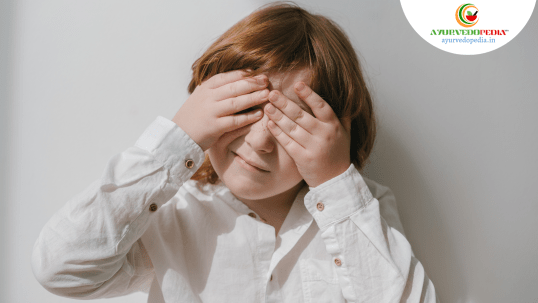Autism is a neurobiological pervasive developmental disorder (PDD) characterized by –
- Severe deficiency in social skills, behavior and reciprocal social interactions
- Difficulty in language, arrangement of words and non-verbal communications
- Intellectual and cognitive deficits. (cannot identify or remember the names and nature of things around him)
Age of onset
The set of symptom varies with age at onset, severity and intellectual level. Onset is usually in 1 to 2 years with failure to progress with age.
Symptoms
Abnormalities in social behavior, social skills, and poor social communications are obvious. Poor verbal and non-verbal language, lack of analytic abilities (to judge what is right or what is wrong etc.), poor reasoning, and non-social behavior can be seen. The skills fail to appear at the usual time of development. Half of the children fail to develop language of any kind. The rest develop sentence, language or eye contact. Hyperacidity, apraxia, insensitivity to pain is common.
Mental retardation is present in almost 75 % of autistic children. No significant developmental progress occurs in half, in natural course. The rest shows minimal improvement. Seizures occur in about 25 percent.
Investigations are usually not required for diagnosing Autism. Childhood autism rating scales are useful to evaluate suspected children.

Ayurvedic Perspective for Autism
Ayurveda has viewed ASD as a behavioral abnormality with its roots situated in the defective neuropsychological system and disorder in the digestive and metabolic system Autism, typical or atypical disabilities and other autistic disorders fall into the category of Unmada (According to Ayurveda), where one or more of the mental abilities go wrong. The whole concept of unmada incorporates various types of inappropriate behavior shown by the person. Hence as a result it creates distortion of the normal mind, intellect, conscious awareness, memory, desire, manner, and behavior.
In the concept of unmada, we see some of the affected faculties that can be seen in Autism spectrum disorders. That involve impairments of –
- Manas (Mind) – total or partial loss of sensory perception
- Buddhi (Intellect) – partially affected, could be irregular as shown in savant skill
- Samjna Jnana (an aware presence) – lost in their own environment, barring one or more
- Bhakti (Ability) – inherent willingness to connect with others
- Seela (Manners) – socially inappropriate outbursts and adherence to strict rigid routines
- Cheshta (Activities) – Motor stereotypes that are improper and compulsive
- Achara (learned skills) – poor socialization skills, failure to obey orders, loss of healthy habits, etc
- Knowledge of acquisition (Jnanotpathi) – one of the essential roles of manas is disrupted in unmada
- Jnanotpathi occurs when Manas is in tune with Atma (soul), Indriya (sense organ), and Indriyartha (objects).
In the etiopathology of Unmada and ASD, the definition of genetic deficiencies (Beeja dushti), antenatal psychological stress, non-congenial dietetics (Virudha ahara) disrupting metabolism (gut-brain axis), defective parental psychological background (parental genetic makeup) and a defective child-rearing mechanism (refrigerated parentage, neglected childhood, monitoring addiction) play a key role.
According to ayurveda, in addition to the diet and activities of the pregnant woman. Her mental state plays a significant role in the development of wellbeing and disease, both mentally and physically in the child.
Ayurvedic Treatment for Autism
Ayurvedic oil for head massage
Brahmi taila is very useful to improve brain functions. Using this oil as a regular oil in autistic children improves their cognitive functions. Lavender essential oil calms the mind and improve concentration. Add 1 drop of this oil to a kerchief and make the child inhale slowly, once a day.
Ayurvedic Herbs used in Autism
1. Brahmi – A study shows Brahmi (Bacopa Monneiri) has established to delay the forgetting process which implies that Brahmi improves memory. A PubMed study article emphasizes the effect of scientific study article on Brahmi in the management of Cognitive deficits, lack of memory power, Attention Deficit Hyperactive Disorder etc.
2. Shatavari – Banaras Hindu University has successfully conducted a study on the anti-depressant activity of Asparagus racemoses in an animal experimental study. Research conducted by Scott (1995) established that Ashwagandha shows high affinity for GABA receptors. GABA agonism and CCK antagonism relates to anxiolysis. These findings support the recommendation in Ayurveda that Ashwagandha is useful in the treatment of Memory loss, Anxiety, Attention deficit disorders etc., which are common features of Autism.
3. Shankhapushpi – A Research conducted in collaboration with Kasturba medical college, Manipal, India showed that, treatment with 100 mg/kg of Clitoria ternatea aqueous root extract (CTR), for 30 days in neonatal and young adult age groups of rat, significantly increased acetylcholine (ACh) content in their hippocampi as compared to age-matched controls. Increase in ACh content in their hippocampus may be the neurochemical basis for their improvised learning and memory.
Beneficial Ayurvedic Products
- Maha kalyanaka ghrita
- Brahmi ghritha
- Saraswata Ghritha
- Saraswatarishta
- Aravindasava
- Manasamitra Vatakam
